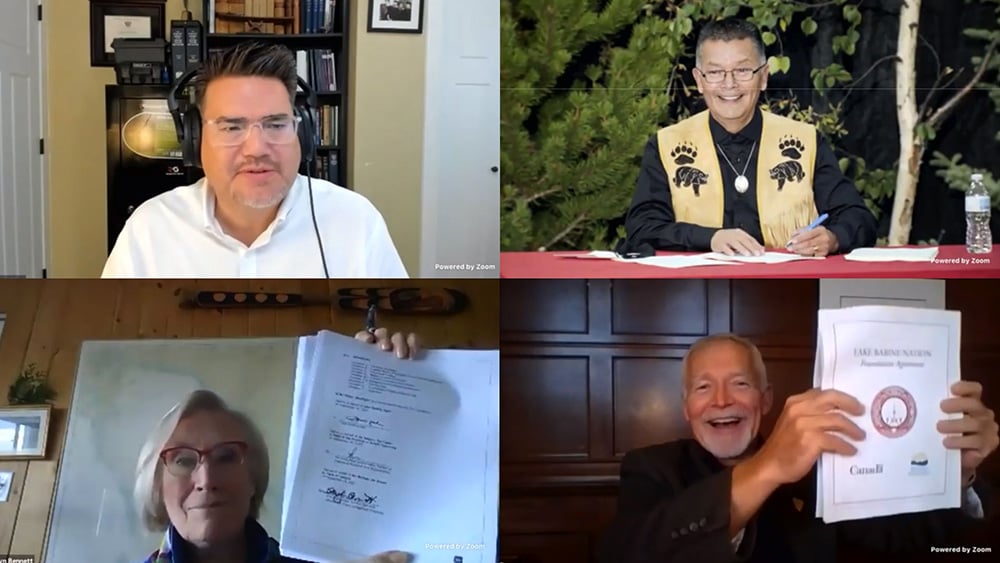A northern B.C. First Nation’s agreement with the provincial and federal governments is being hailed as a groundbreaking step in securing Indigenous rights and title that could provide a model for other reconciliation agreements.
During a signing ceremony held today via teleconference, Carolyn Bennett, Canada’s minister of Crown-Indigenous relations, called the agreement with Lake Babine Nation “a model for the country.”
Described as a “foundational agreement,” it provides a 20-year framework for the three governments to move forward on implementing the nation’s rights and title.
In the short term, it provides immediate land and financial benefits worth about $200 million, including the transfer of 20,000 hectares of land to the nation and $43 million in funding for economic development and other initiatives.
The signing was moderated by Lake Babine Nation’s chief negotiator Doug White and opened with a song and prayer by students from the nation’s Morris Williams Elementary School.
Chief Gordon Alec, a long-time band councillor who was elected chief in 2018, dedicated the signing to the nation’s children.
“They are an important reminder of why we have worked so hard over many years to get to this stage,” he said. “This day is for them, because it is our job to create a better future. A future where children and grandchildren may live their lives in self-determination with the benefit of their Aboriginal title, and in health and dignified relationship with British Columbia, Canada and their citizens.”
The nation began working with the province toward the agreement in 2016, building on the work of previous reconciliation initiatives between the two governments. The federal government joined the negotiations in 2018, according to the province’s website.
The province says it engaged with stakeholders, such as local government, industry and tenure holders, as well as neighbouring property owners, and that neighbouring First Nations were also consulted.
When asked whether the agreement bears similarities to the process currently underway with the Wet’suwet’en Nation, which shares a territorial boundary with Lake Babine, Alec said it’s “totally different.”
“It’s recognizing and also implementing our title and rights as a new partnership in B.C. and Canada as Lake Babine Nation. We want to work with everybody, industry and everyone’s that’s involved, to pave the way for a proper economy,” he said.
Bennett said the agreement sets out a path for future agreements with the nation that recognize and incrementally implement rights and title and said it provides Lake Babine with the resources to develop its own governance model. The process has included both hereditary and elected leadership, she noted.
Alec said the nation is currently discussing what its governance model will look like.
“Discussions between elected and hereditary leadership are ongoing, and we look forward to continuing positive discussions between our leadership groups,” he said. “Elected leadership, hereditary leadership and other Lake Babine members have already started discussing what Lake Babine Nation’s governance model will look like in a Governance Advisory Team, which will in turn be engaging with all Lake Babine’s clans and the membership as a whole.”
Premier John Horgan, who didn’t attend due to a scheduling conflict, made a brief appearance on the Zoom call over B.C. Indigenous Relations and Reconciliation Minister Scott Fraser’s shoulder. He said that the agreement demonstrates “not just to each other but the rest of the world that Canada, British Columbia and Indigenous people are on the same page going forward.”
Fraser called the agreement “ambitious.”
“It’s a 20-year vision laid out step by step to implement Lake Babine rights and title. The province will be a partner all the way through that,” he said. “With this roadmap, we have a clear way forward to work together to implement self-governance, to boost economic development, collaborate on land and resource decisions and promote community wealth, well-being and health.”
He added that the agreement provides a new model for B.C. in working with First Nations and that it will provide clarity and predictability for everyone in the province.
“We are moving beyond the denials of Indigenous rights into a new government-to-government relationship,” he said.
“I know there are other nations watching this, because it is quite unique. It is innovative. It is everybody at the table thinking outside the box,” Fraser said. “Agreements are often somewhat unique; this one is very unique, but I believe it is going to be a model for others as we move forward.”
Chief Alec recognized those who had worked on the agreement, including former Lake Babine Nation chief Wilf Adam and promised a feast to celebrate its signing once the pandemic has passed.
“We will invite you all to be our guests here in the beautiful lands and waters that have come down to us from our ancestors,” he said.
“We sign this agreement today without sacrificing our rights, our title and our future interests and the rest of our territory. Quite the opposite in fact. This agreement is about recognition and implementation of our rights and title.
“The work ahead will not be simple or easy work. The foundation agreement will guide us together toward a new reality premised on mutual recognition and respect.” ![]()
Read more: Indigenous, Federal Politics, BC Politics
















Tyee Commenting Guidelines
Comments that violate guidelines risk being deleted, and violations may result in a temporary or permanent user ban. Maintain the spirit of good conversation to stay in the discussion.
*Please note The Tyee is not a forum for spreading misinformation about COVID-19, denying its existence or minimizing its risk to public health.
Do:
Do not: